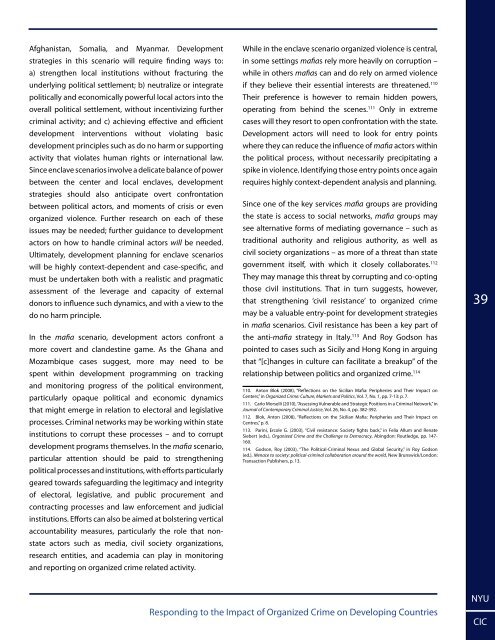here - Center on International Cooperation - New York University
here - Center on International Cooperation - New York University
here - Center on International Cooperation - New York University
You also want an ePaper? Increase the reach of your titles
YUMPU automatically turns print PDFs into web optimized ePapers that Google loves.
Afghanistan, Somalia, and Myanmar. Development<br />
strategies in this scenario will require finding ways to:<br />
a) strengthen local instituti<strong>on</strong>s without fracturing the<br />
underlying political settlement; b) neutralize or integrate<br />
politically and ec<strong>on</strong>omically powerful local actors into the<br />
overall political settlement, without incentivizing further<br />
criminal activity; and c) achieving effective and efficient<br />
development interventi<strong>on</strong>s without violating basic<br />
development principles such as do no harm or supporting<br />
activity that violates human rights or internati<strong>on</strong>al law.<br />
Since enclave scenarios involve a delicate balance of power<br />
between the center and local enclaves, development<br />
strategies should also anticipate overt c<strong>on</strong>fr<strong>on</strong>tati<strong>on</strong><br />
between political actors, and moments of crisis or even<br />
organized violence. Further research <strong>on</strong> each of these<br />
issues may be needed; further guidance to development<br />
actors <strong>on</strong> how to handle criminal actors will be needed.<br />
Ultimately, development planning for enclave scenarios<br />
will be highly c<strong>on</strong>text-dependent and case-specific, and<br />
must be undertaken both with a realistic and pragmatic<br />
assessment of the leverage and capacity of external<br />
d<strong>on</strong>ors to influence such dynamics, and with a view to the<br />
do no harm principle.<br />
In the mafia scenario, development actors c<strong>on</strong>fr<strong>on</strong>t a<br />
more covert and clandestine game. As the Ghana and<br />
Mozambique cases suggest, more may need to be<br />
spent within development programming <strong>on</strong> tracking<br />
and m<strong>on</strong>itoring progress of the political envir<strong>on</strong>ment,<br />
particularly opaque political and ec<strong>on</strong>omic dynamics<br />
that might emerge in relati<strong>on</strong> to electoral and legislative<br />
processes. Criminal networks may be working within state<br />
instituti<strong>on</strong>s to corrupt these processes – and to corrupt<br />
development programs themselves. In the mafia scenario,<br />
particular attenti<strong>on</strong> should be paid to strengthening<br />
political processes and instituti<strong>on</strong>s, with efforts particularly<br />
geared towards safeguarding the legitimacy and integrity<br />
of electoral, legislative, and public procurement and<br />
c<strong>on</strong>tracting processes and law enforcement and judicial<br />
instituti<strong>on</strong>s. Efforts can also be aimed at bolstering vertical<br />
accountability measures, particularly the role that n<strong>on</strong>state<br />
actors such as media, civil society organizati<strong>on</strong>s,<br />
research entities, and academia can play in m<strong>on</strong>itoring<br />
and reporting <strong>on</strong> organized crime related activity.<br />
While in the enclave scenario organized violence is central,<br />
in some settings mafias rely more heavily <strong>on</strong> corrupti<strong>on</strong> –<br />
while in others mafias can and do rely <strong>on</strong> armed violence<br />
if they believe their essential interests are threatened. 110<br />
Their preference is however to remain hidden powers,<br />
operating from behind the scenes. 111 Only in extreme<br />
cases will they resort to open c<strong>on</strong>fr<strong>on</strong>tati<strong>on</strong> with the state.<br />
Development actors will need to look for entry points<br />
w<str<strong>on</strong>g>here</str<strong>on</strong>g> they can reduce the influence of mafia actors within<br />
the political process, without necessarily precipitating a<br />
spike in violence. Identifying those entry points <strong>on</strong>ce again<br />
requires highly c<strong>on</strong>text-dependent analysis and planning.<br />
Since <strong>on</strong>e of the key services mafia groups are providing<br />
the state is access to social networks, mafia groups may<br />
see alternative forms of mediating governance – such as<br />
traditi<strong>on</strong>al authority and religious authority, as well as<br />
civil society organizati<strong>on</strong>s – as more of a threat than state<br />
government itself, with which it closely collaborates. 112<br />
They may manage this threat by corrupting and co-opting<br />
those civil instituti<strong>on</strong>s. That in turn suggests, however,<br />
that strengthening ‘civil resistance’ to organized crime<br />
may be a valuable entry-point for development strategies<br />
in mafia scenarios. Civil resistance has been a key part of<br />
the anti-mafia strategy in Italy. 113 And Roy Gods<strong>on</strong> has<br />
pointed to cases such as Sicily and H<strong>on</strong>g K<strong>on</strong>g in arguing<br />
that “[c]hanges in culture can facilitate a breakup” of the<br />
relati<strong>on</strong>ship between politics and organized crime. 114<br />
110. Ant<strong>on</strong> Blok (2008), “Reflecti<strong>on</strong>s <strong>on</strong> the Sicilian Mafia: Peripheries and Their Impact <strong>on</strong><br />
<str<strong>on</strong>g>Center</str<strong>on</strong>g>s,” in Organized Crime: Culture, Markets and Politics, Vol. 7, No. 1, pp. 7-13: p. 7.<br />
111. Carlo Morselli (2010), “Assessing Vulnerable and Strategic Positi<strong>on</strong>s in a Criminal Network,” in<br />
Journal of C<strong>on</strong>temporary Criminal Justice, Vol. 26, No. 4, pp. 382-392.<br />
112. Blok, Ant<strong>on</strong> (2008), “Reflecti<strong>on</strong>s <strong>on</strong> the Sicilian Mafia: Peripheries and Their Impact <strong>on</strong><br />
Centres,” p. 8.<br />
113. Parini, Ercole G. (2003), “Civil resistance: Society fights back,” in Felia Allum and Renate<br />
Siebert (eds.), Organized Crime and the Challenge to Democracy, Abingd<strong>on</strong>: Routledge, pp. 147-<br />
160.<br />
114. Gods<strong>on</strong>, Roy (2003), “The Political-Criminal Nexus and Global Security,” in Roy Gods<strong>on</strong><br />
(ed.), Menace to society: political-criminal collaborati<strong>on</strong> around the world, <strong>New</strong> Brunswick/L<strong>on</strong>d<strong>on</strong>:<br />
Transacti<strong>on</strong> Publishers, p. 13.<br />
39<br />
Resp<strong>on</strong>ding to the Impact of Organized Crime <strong>on</strong> Developing Countries<br />
NYU<br />
CIC
















